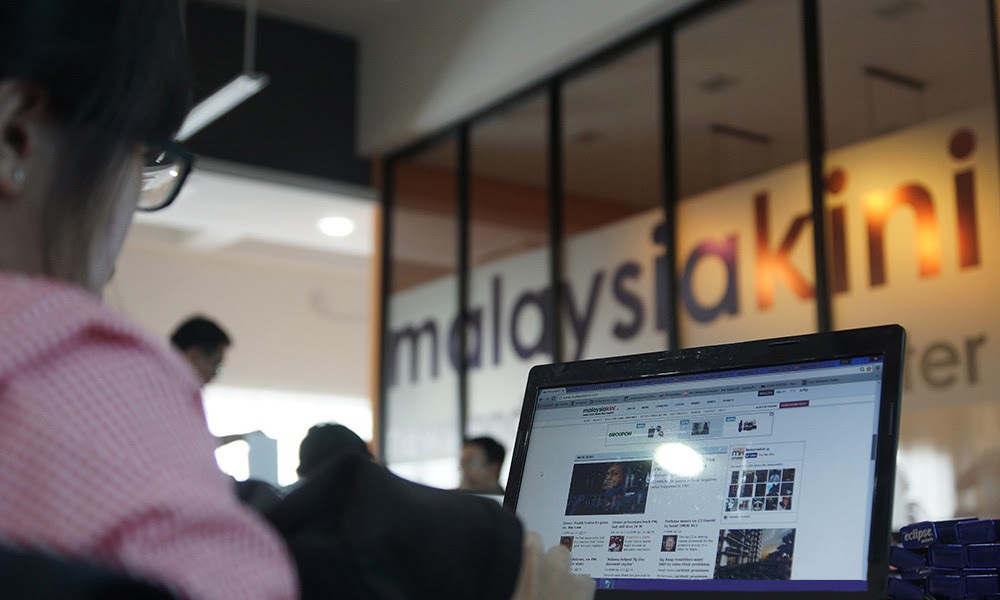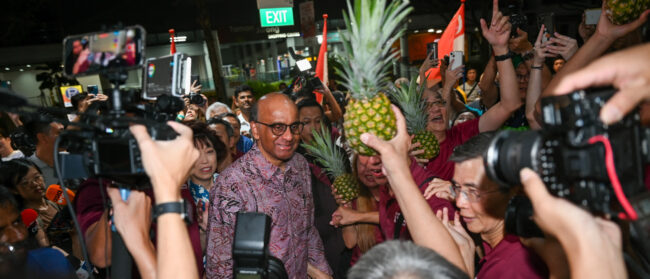Free speech comes with a hefty price in Malaysia. When four readers left comments criticising the judiciary on a news report published by independent online platform Malaysiakini in June, little did they know that it would cost the news outlet some $124,000.
For these comments, Malaysiakini was found guilty of contempt of court and fined half a million ringgit last week on February 19. Critics slammed the conviction as a blow to press freedom, and public outrage only grew with the news the fine was more than double what prosecutors had initially sought. The frustration supercharged a crowdfunding campaign that raised enough money to pay off the fine within just four hours.
The massive support from donors and the public at large might just be only a temporary respite for the publication. Even while the fine may be paid off, Malaysiakini editor-in-chief and co-founder Steven Gan, as well as parliament member Charles Santiago, the current chairman of ASEAN Parliamentarians for Human Rights, are currently under investigation for sedition for criticising the court verdict against the news outlet.
Speaking to the Globe from Kuala Lumpur this week, Zikri Kamarulzaman, a senior journalist and acting editor of Malaysiakini, labelled the fine excessive.
“This was third party commenters publishing comments on an article, which we deleted as soon as the moment it was flagged. And the Federal Court still deemed that this was contemptuous enough, and that we should have been responsible for these comments,” he explained.
With most publications and media outlets in Malaysia closely affiliated to various political parties under the Printing Presses and Publications Act 1984, the Malaysian media landscape is dominated by pro-government voices. Formed under the tumultuous political climate during the Reformasi era back in 1999, Malaysiakini shook up the media landscape as the first independent online news platform in Malaysia, and today is one of only a few providing unbiased perspectives and an independent voice.
The story itself was innocuous and there was no reason to suspect that there were any offensive comments on it. I guess that is how it slipped under the radar
But while Malaysiakini does not shy away from controversial topics, this specific article that was flagged, discussing how courts would resume operations at a stage where the country was easing pandemic lockdown restrictions, took Zikri by surprise.
“The story itself was innocuous and there was no reason to suspect that there were any offensive comments on it. I guess that is how it slipped under the radar, when cops alerted us we deleted the comments. Not long after that, charges were made,” Zikri said.
He added that had there not been a successful crowdfunding campaign, the fine would have dealt a significant blow to the outlet.
“I am not sure about the severity of impact, but I know it would have been a serious one. During the lockdown, we are fortunate that we do not have to lay off any staff and get by only with salary cuts. A hefty fine like that is not something to be taken lightly,” he said.
After Malaysiakini’s guilty verdict on February 19, Gan told reporters the ruling “will have a tremendous chilling impact on discussions of issues of public interest” that “put a huge burden on media organisations”. He is now under investigation again for these comments, along with MP Santiago, under the country’s sedition and multimedia laws.
Opposition parties voiced support for him, reiterating the need to distinguish critics against a court decision with seditious remarks questioning the integrity of the judiciary. Zikri views the sedition charges against editor Steven Gan as an act of spite, following the ease in which they met the other fine.
“I guess when we were able to collect the money within a few hours, the people who were not supportive of us decided to ‘try something else’,” he said.

The Centre for Independent Journalism (CIJ) in Malaysia labelled the court verdict and the use of Section 114A of the Evidence Act 1950 against Malaysiakini as an attack on press freedom. Section 114A states that “there is the presumption that facilitating the publication of the comments is tantamount to publishing the comments in itself”.
“Whoever runs a website where people can comment will have to be extra careful about monitoring the comments,” Zikri said. “If you are getting only several comments a day, it is easy; but if you are getting hundreds and thousands of comments daily, it will be difficult for a small team like Malaysiakini. We will have to consider things like pre-moderation, which amounts to censorship.”
The court decision could very likely have far-reaching consequences on social media and online news platforms in Malaysia. If the onus lies fully on the administrators to moderate and censor comments, they could resort to disabling the comment section as a precautionary measure, effectively depriving users of their ability to comment.
For Zikri and Malaysiakini, the broad and impreciseness of the law, along with its potential applications, are concerning.
“If you are a Facebook moderator, are you also responsible for the thousands of comments that people post daily? And on Twitter, you have zero ability to delete tweets, so is Twitter as a platform then responsible for deleting tweets? Must Twitter pre-censor comments? Technically speaking, you could apply the laws in such ways.”
Malaysiakini has always taken a bold stance on its reporting, bringing issues like corruption and cronyism among the political elites into the light – making them no stranger to police harassment.
“Back in the early years, we experienced police raids and confistications of computers. In 2015, the Malaysian Communications and Multimedia Commission raided the office and confiscated our laptops over a news report that the Attorney General wasn’t quite happy with,” Zikri said.
Zikri likened their editorial stance to that of CNN, saying that in Malaysia their centre-left position stands out in a landscape of pro-government reporting.
“I think Malaysiakini is similar to CNN in the US, and it has been like that for 20 years. Fox News and conservative viewpoints have always been the norm in Malaysia for many decades. When we were fined, a lot of people were celebrating!” he said.
After that election, there was a general feeling that the media had a stronger voice. I was out the morning after the election, watching Astro Awani which typically follows the government line
Zikri pointed to the 2018 shock election victory of the Pakatan Harapan – toppling the Barisan Nasional after six decades of rule – as a turning point for press freedom in Malaysia, offering a glimpse of hope with promises of governmental reforms and repeal of archaic laws limiting expression. But the undemocratic toppling of the Pakatan Harapan coalition in February 2020, that led the current “backdoor” Perikatan Nasional coalition to come to power, has pushed the struggle for media freedom back to square one.
“After that election, there was a general feeling that the media had a stronger voice. I was out the morning after the election, watching Astro Awani which typically follows the government line,” he said. “That morning, they were airing views of people bashing the former government left, right and centre, and even the news anchor was very emotional about it, and I am like ‘ah, things are changing!’”
Blacklisted media outlets and journalists had been able to operate without fear of harassment, followed by the repealing of the draconian Anti-Fake News Act 2018 enacted by the outgoing BN government.
But now, the hope for restoration of press freedom has been reduced to a dim flicker, as the PN government launched a series of aggressive crackdown on press freedom after coming to power in February last year.
Back in July 2020, Al-Jazeera was investigated for sedition, defamation and violation of the Communications and Multimedia Act after airing a documentary exposing the inhumane treatment of migrant workers in Malaysia during a pandemic.
Now, Malaysiakini faces similar challenges, with media groups viewing it as a form of intimidation to impact press freedom. For Zikri, he’s reluctant to speculate as to the motivations behind last week’s ruling, but he’s hardly surprised.
“Whether or not the ruling on Friday [February 19] is an attempt to silence the media and silence critics [I can’t say],” Zikri said. “But given that this is Malaysia, it is not entirely surprising.”


